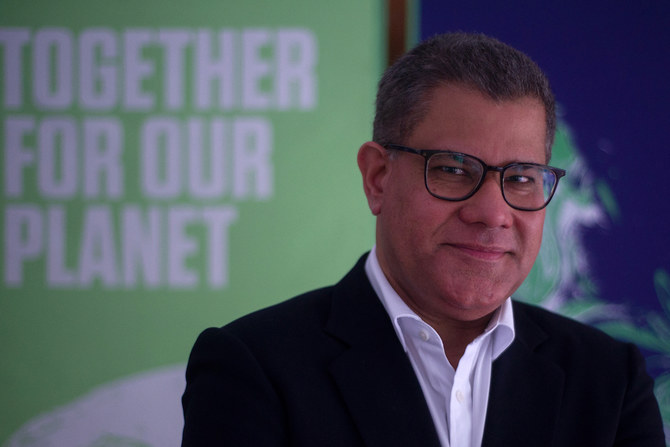JEDDAH: It is now indisputable: The planet is getting hotter, and unless governments take immediate action to cut greenhouse gas emissions, dramatic changes to the climate will become irreversible. That was the verdict of the world’s foremost climate scientists in a report published earlier this month.
Dubbed “code red for humanity” by UN chief Antonio Guterres, the report issued by the UN’s Intergovernmental Panel on Climate Change says human activity over the past century has already fundamentally altered the natural order.
To prevent a global temperature rise of more than 2 C by the year 2030, scientists believe governments must substantially cut their carbon emissions — and fast.
The effects of climate change are especially clear in the Arab states of the Middle East and North Africa region, where drought and temperatures in excess of 50 C have now become the norm.
Over the past 40 years alone, average temperatures in Saudi Arabia have risen by more than 2 C — three times the current global average.
“Global average temperatures can be misleading because they hide local temperature increases,” Natalia Odnoletkova, a Ph.D. student at Saudi Arabia’s King Abdullah University of Science and Technology majoring in earth sciences, told Arab News.
“Based on research, we concluded that the rate of temperature increase in Saudi Arabia is drastic. This is what people often misunderstand. When we speak in the context of just 1 degree, we should understand that global average temperature can be misleading.”
Perhaps the biggest environmental challenge facing the Kingdom and other MENA countries is water scarcity. Underground aquifers are not replenishing fast enough to meet commercial and industrial demand, while desalination techniques and foreign imports are damaging and unsustainable.
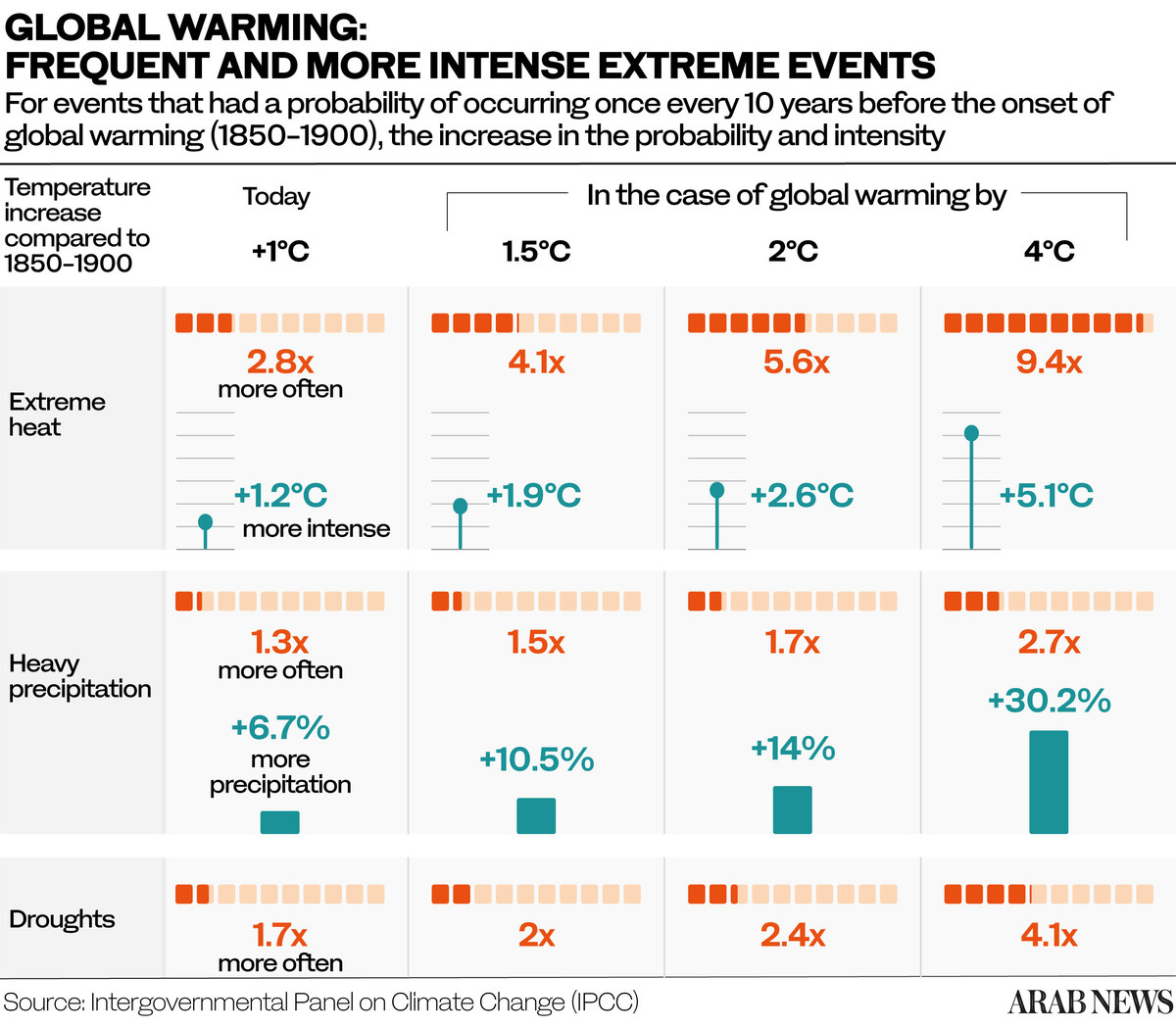
In response to mounting calls on all governments to act, the Kingdom ratified the Paris Agreement in November 2015 and communicated to the UN Framework Convention on Climate Change its intention to cut up to 130 million tons of CO2 emissions by 2030.
Early last year, analysis by the King Abdullah Petroleum Studies and Research Center showed that Saudi Arabia has become the third-fastest reducer of emission from fuel consumption among G20 countries.
It found that CO2 emissions in the Kingdom had fallen by 26 million tons — down some 4.4 percent over the previous year.
Even if societies move away from fossil fuels, there is no guarantee temperatures will remain stable enough for the planet to cool. Governments will also have to invest in restoration to repair the damage inflicted on the environment over many decades.

Saudis work at a solar panel factory in Uyayna, north of Riyadh. (AFP/File Photo)
This year’s record-breaking summer temperatures, flash flooding across China, central Europe and the US — and simultaneous forest fires on almost every continent — have been cited as the latest destructive manifestations of accelerating climate change.
The burning of fossil fuels, the clearing of forests to make way for agriculture and industry, and the ravaging of vulnerable ocean ecosystems by chemical pollutants have rapidly increased the concentration of greenhouse gases in the atmosphere.
After the first Industrial Revolution began in the 1750s, the amount of carbon dioxide in the atmosphere gradually rose to about 5 billion tons per year by the mid-20th century, before skyrocketing to more than 35 billion tons by the end of the century.
“An all-hands-on-deck approach is needed in order to meet our shared climate goals,” Carlos Duarte, a professor of marine science at KAUST and an internationally renowned marine biologist, told Arab News.
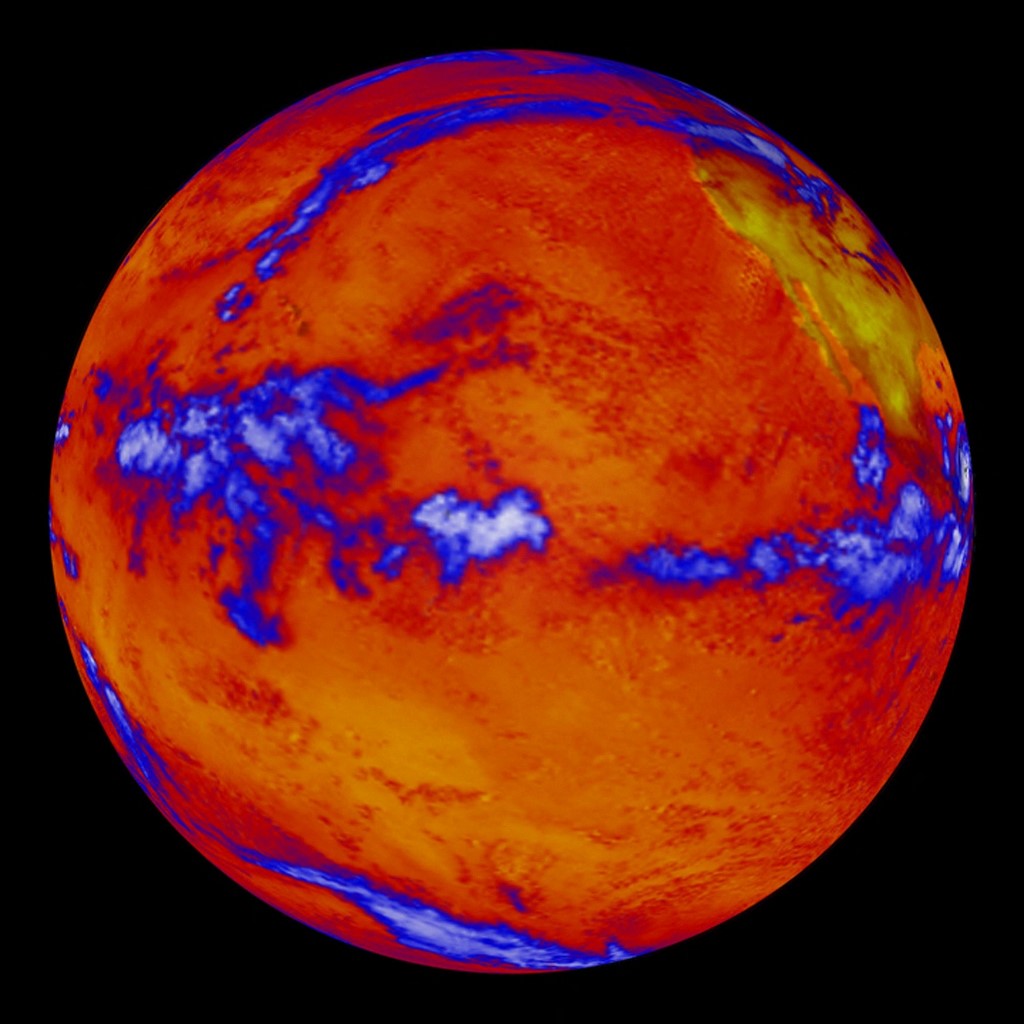
This NASA image obtained October 6, 2014 shows heat radiating from the Pacific Ocean as imaged by the NASA’s Clouds and the Earth's Radiant Energy System instrument on the Terra satellite. (AFP via NASA/File Photo)
“This requires global collaboration and activating all options, even those that do not seem to currently have a sufficient scale.
“Once we achieve these goals, the world needs to embrace a program of atmospheric restoration, as holding CO2 levels at the threshold may lead to unpleasant and catastrophic surprises if events, either natural or anthropogenic but unanticipated, lead to a release of greenhouse gases into the atmosphere.”
INNUMBERS
* 137m MWH - Electricity consumption in KSA residential sector in 2020.
* 144m MWH - Electricity consumption in KSA residential sector in 2015.
That is why, in the lead-up to November’s UN Climate Change Conference (COP26) in Glasgow, Saudi Arabia has joined the club of countries and associations that have launched bold efforts to cut greenhouse gas emissions, restore ecosystems and reduce their environmental footprint.
Saudi Arabia has pioneered the framework of the Circular Carbon Economy (CCE) as a way of tackling the climate change challenge. This approach was endorsed unanimously last year at the G20 summit of world leaders under the Saudi presidency.
CCE advocates the reduction, recycling and reuse of carbon emissions across industrial processes, which are goals that are now familiar and accepted across the world as a way of mitigating harmful emissions.
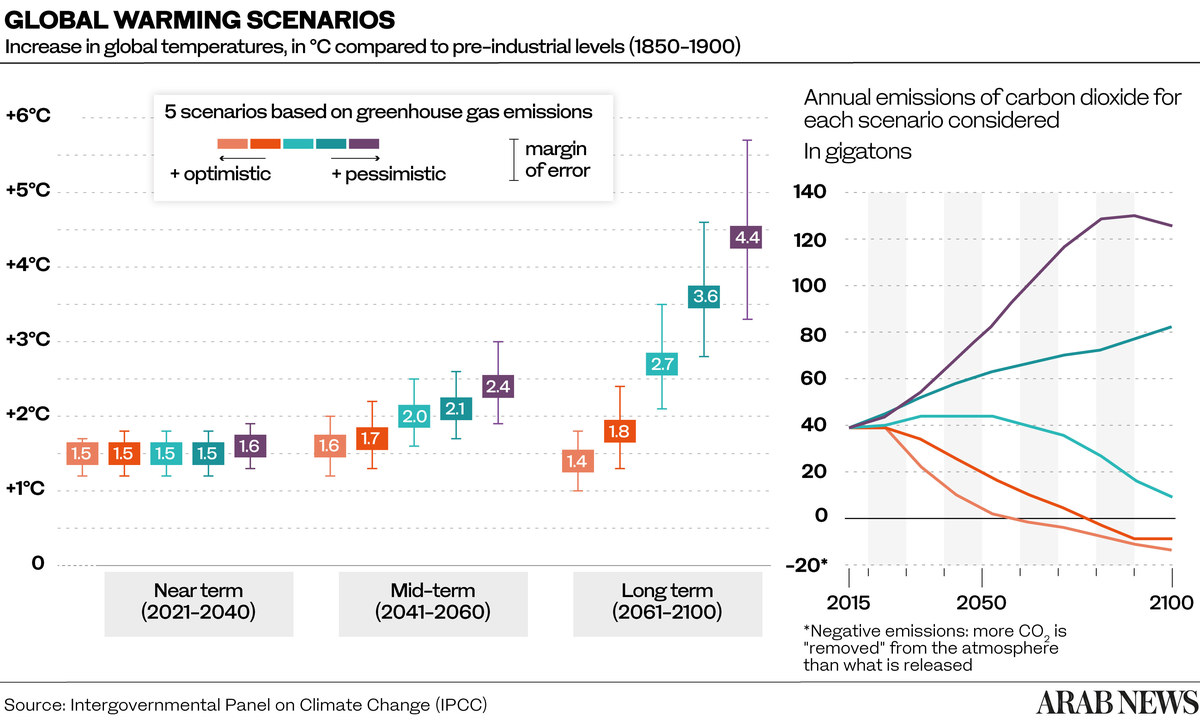
Carbon capture, utilization and storage are essential if greenhouse gases are to be gradually eliminated as a threat to the atmosphere and the environment.
The Kingdom is also leading the way in the GCC with the Saudi Green Initiative and the Middle East Green Initiative, which aim to reduce carbon emissions by 60 percent with the help of clean hydrocarbon technologies and by planting 50 billion trees, including 10 billion in the Kingdom.
“Afforestation projects can indeed contribute to removing CO2, increasing biodiversity and avoiding land degradation,” said Duarte.
“They need to be very carefully planned, monitored and protected. Achieving the very ambitious goals of afforestation under the Saudi Green initiative will be indeed very challenging, but will generate major benefits to the Kingdom and the planet.”
These positive steps were recently acknowledged by John Kerry, the US climate envoy, who also lauded Riyadh’s plan to invest $5 billion in the world’s largest green hydrogen plant in NEOM — the smart city under construction on the Red Sea coast.

Saudi Arabia has ratified the Paris Agreement in November 2015 and communicated to the UN Framework Convention on Climate Change its intention to cut up to 130 million tons of CO2 emissions by 2030. (AFP/File Photo)
As part of the framework for local action on climate change, NEOM is exploring several potential initiatives to combat rising temperatures as well as restore ecosystems, including one critical marine discovery that could benefit other coastal habitats.
Researchers claim that many coral species found off the Red Sea coast of NEOM appear to be preconditioned to survive in higher sea-surface temperatures.
“This natural resilience provides an opportunity for NEOM to grow corals that can be used for reef-restoration activities and it is planning the world’s largest coral garden from nursery-grown corals,” Damien Trinder, Acting Chief Environment Officer at NEOM, told Arab News.
“This program may also help offset the impacts of climate change already reported in other parts of the world by providing resilient coral strains for export globally.”
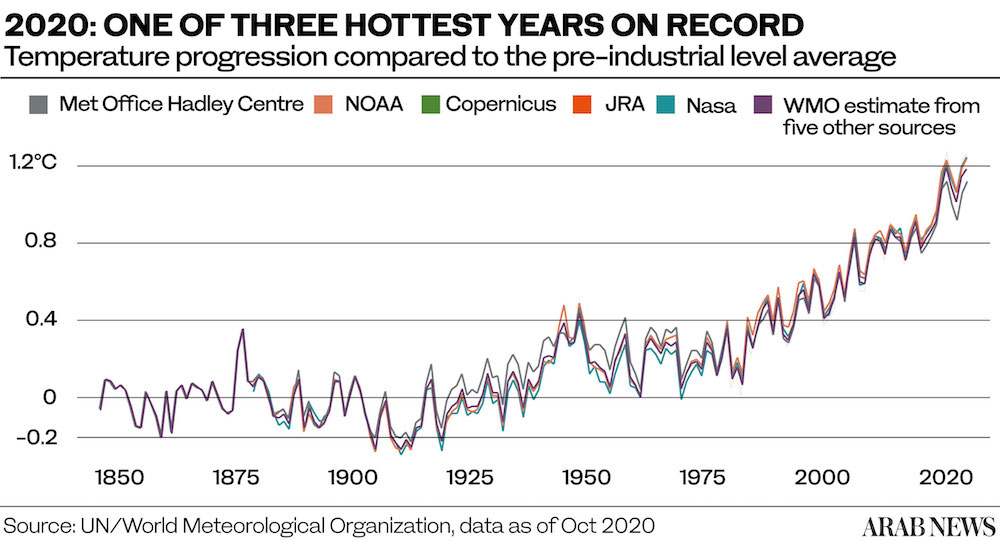
Another innovation championed by NEOM is a plan to increase the use of locally and regionally grown native plants in gardens and public spaces.
“These species are naturally adapted to hot, dry conditions, use significantly less water than non-native species and provide additional habitats for birds, insects, and other fauna,” said Trinder.
Indeed, while governments are busy looking for ways to prevent the further warming of the planet, they are also searching for ways to adapt to already fast-evolving habitats. But that is not to say the world should sit on its hands and accept climate change is inevitable, say scientists.
“Our choices today can make a real positive difference,” said Trinder. “In the same way, we can make choices, such as making sure we minimize electricity use in offices and homes and selecting local produce over imported, which can help both the climate as well as the local economy.”
------------------
Twitter: @Rawanradwan8


